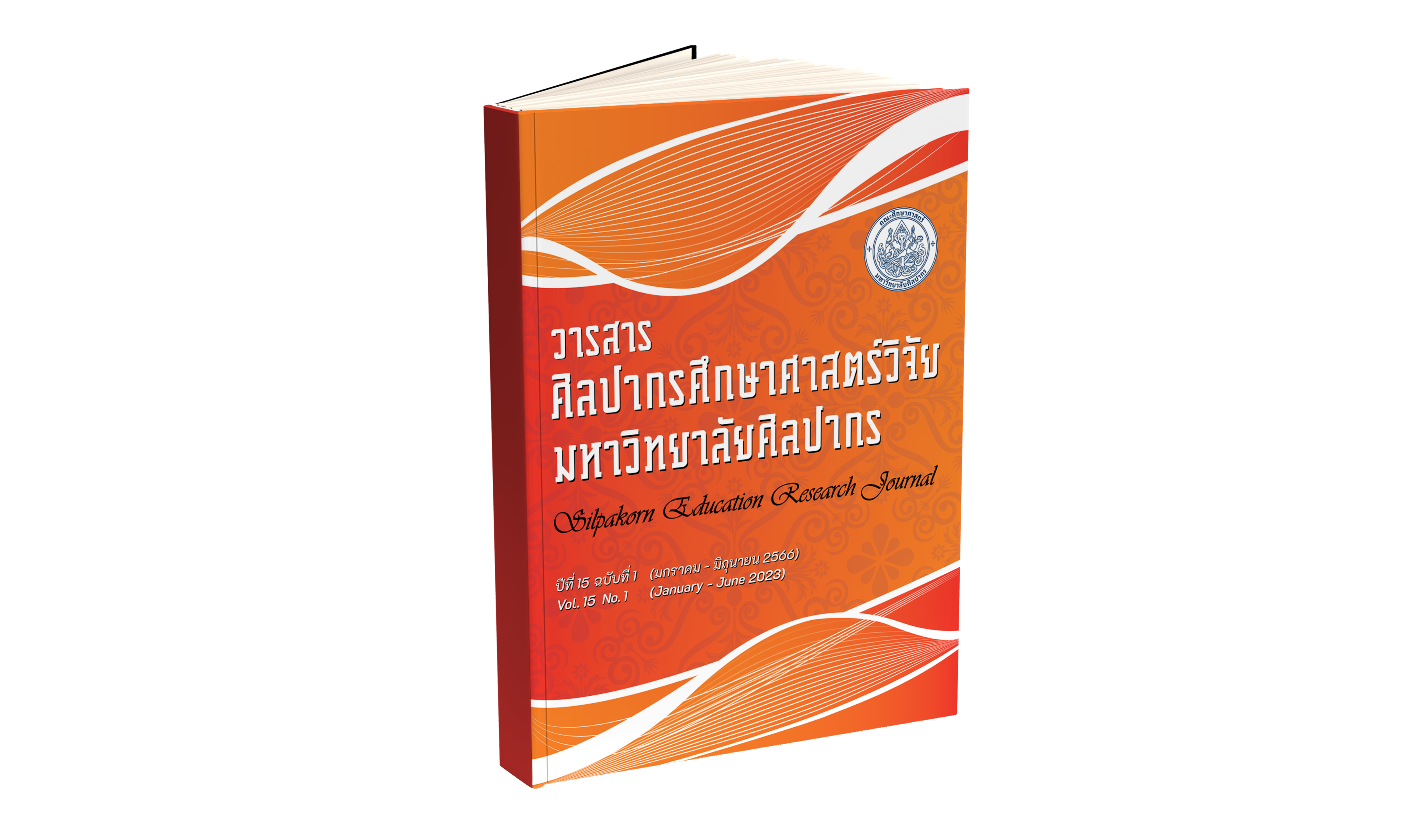ผลการจัดการเรียนรู้แบบสืบเสาะหาความรู้ร่วมกับแอปพลิเคชันเพื่อการศึกษา ที่มีต่อผลสัมฤทธิ์ทางการเรียนและเจตคติต่อการเรียนวิชาสังคมศึกษาของนักเรียนชั้นมัธยมศึกษาปีที่ 3
คำสำคัญ:
การจัดการเรียนรู้แบบสืบเสาะหาความรู้, แอปพลิเคชันเพื่อการศึกษา, ผลสัมฤทธิ์ทางการเรียนบทคัดย่อ
การวิจัยนี้มีวัตถุประสงค์เพื่อ 1) เปรียบเทียบผลสัมฤทธิ์ทางการเรียนของนักเรียนก่อนและหลังการจัดการเรียนรู้แบบสืบเสาะหาความรู้ร่วมกับแอปพลิเคชันเพื่อการศึกษา 2) เปรียบเทียบผลสัมฤทธิ์ทางการเรียนของนักเรียนที่ได้รับการจัดการเรียนรู้แบบสืบเสาะหาความรู้ร่วมกับแอปพลิเคชันเพื่อการศึกษากับเกณฑ์ร้อยละ 70 ของคะแนนเต็ม 3) ศึกษาเจตคติต่อการเรียนวิชาสังคมศึกษาของนักเรียนที่ได้รับการจัดการเรียนรู้แบบสืบเสาะหาความรู้ร่วมกับแอปพลิเคชันเพื่อการศึกษา กลุ่มตัวอย่างคือ นักเรียนชั้นมัธยมศึกษาปีที่ 3/6 โรงเรียนตาคลีประชาสรรค์ จังหวัดนครสวรรค์ จำนวน 41 คน ที่ได้จากการสุ่มแบบหลายขั้นตอน เครื่องมือที่ใช้ในการวิจัยได้แก่ 1) แผนการจัดการเรียนรู้ 2) แบบทดสอบวัดผลสัมฤทธิ์ทางการเรียน และ 3) แบบวัดเจตคติต่อการเรียน การวิเคราะห์ข้อมูลโดยใช้ค่าเฉลี่ย ค่าส่วนเบี่ยงเบนมาตรฐาน การทดสอบค่าทีกรณีกลุ่มตัวอย่างไม่เป็นอิสระต่อกัน และการทดสอบทีกรณีกลุ่มตัวอย่างเดียว
ผลการวิจัยพบว่า 1) นักเรียนที่ได้รับการจัดการเรียนรู้แบบสืบเสาะหาความรู้ร่วมกับแอปพลิเคชันเพื่อการศึกษามีผลสัมฤทธิ์ทางการเรียนหลังเรียนสูงกว่าก่อนเรียนอย่างมีนัยสำคัญทางสถิติที่ระดับ .05 2) นักเรียนที่ได้รับการจัดการเรียนรู้แบบสืบเสาะหาความรู้ร่วมกับแอปพลิเคชันเพื่อการศึกษามีผลสัมฤทธิ์ทางการเรียนหลังเรียนสูงกว่าเกณฑ์ร้อยละ 70 ของคะแนนเต็มอย่างมีนัยสำคัญทางสถิติที่ระดับ .05 3) นักเรียนที่ได้รับการจัดการเรียนรู้แบบสืบเสาะหาความรู้ร่วมกับแอปพลิเคชันเพื่อการศึกษามีเจตคติต่อการเรียนวิชาสังคมศึกษาในระดับมาก
เอกสารอ้างอิง
Arkorful, V. and Abaidoo, N. (2014). “The Role of E-Learning The Advantages and Disadvantages of It’s Adoption in Higher Education”. International Journal of Education and Research 2(12): 397-410.
Art-in, S. (2019). The Science and Art of Learning in the 21st Century. 2th edition. Khon Kaen: Khon Kaen University Printing House. (in Thai)
Asiri, A. (2022). Liveworksheets: Create Your Own Interactive Worksheets. [Online]. Retrieved April 25, 2022, from https://www.researchgate.net/profile/Ali-Asiri-7/publication/357718923
_Liveworksheets_Create_Your_Own_Interactive_Worksheets/links/61dcb343323a2268f9978bc8/Liveworksheets-Create-Your-Own-Interactive-Worksheets.pdf.
Boochayan, A. (2020). “Using Google Earth for Geographical Learning”. Journal of Humanities and Social Sciences Loei Rajabhat University 2(2): 18-29. (in Thai)
Chomeya. (2010). Psychology: The basis for understanding human behavior. Maha Sarakham: Mahasarakham University Press. (in Thai)
Dechagun, D. (2016). The Development of Learning Outcomes and Knowledge Seeking Skills on Thai Wisdom of Mathayomsuksa 2Students Using Inquiry Based Learning. Master of Education Thesis Program in Curriculum and Teaching Methods Graduate School Faculty of Education Silpakorn University. (in Thai)
Dechakup, P. (2001). Student Centered Teaching Concepts, Methods and Teaching Techniques 1. Bangkok: The Master Group Management. (in Thai)
. (2018). Integrated Active Learning with PLC for Development. 1th edition. Bangkok: Chulalongkorn University Press. (in Thai)
Eiamprasert, S., Sirisawat, C. and Chauvatcharin, N. (2020). “The Effects of 5E Inquiry Learning Management with Questioning Technique on Learning Achievement and Concepts in Biology of Secondary Education Year 4 Students”. Faculty of Humanities and Social Sciences Thepsatri Rajabhat University 12(1): 15-28.
Gikas, J. and Grant, M. M. (2013). “Mobile Computing Devices in Higher Education: Student Perspectives on Learning with Cellphones, Smartphones and Social Media”. Internet and Higher Education (19): 18-26.
Kaewkor, C., Phomson, S. and Meesup, P. (2021). “Development of the Application Course on Social Studies Religion and Culture Subject on the Topic of Good Buddhist for Grade 2 Student in Watthaichumphon Municipality School”. Humanities and Social Sciences Journal of Pibulsongkram Rajabhat University 15(2): 443-454. (in Thai)
Ketsoontron, S. and Suthamdee, C. (2021). “Education in the Disruptive Technology Education in Disruptive Technology”. Journal of local Governance and Innovation 5(3): 73-86. (in Thai)
Khammanee, T. (2018). The Science of Teaching Knowledge for Organizing Effective Learning Process. 22th edition. Bangkok: Chulalongkorn University Press. (in Thai)
Khlongwa, A. (2021). “The Effect of Inquiry Method on Science Subject Achievement”. Phuket Rajabhat University Academic Journa 17(1): 98-112. (in Thai)
Miller, K. (2019). The Benefits of Online Learning: 7 Advantages of Online Degrees. [Online]. Retrieved April 16, 2022, from https://www. northeastern.edu/graduate/blog/benefits-of-on-line-learning/.
Ministry of Education. (2008). The Basic Education Core Curriculum B.E. 2551 (A.D. 2008). [Online]. Retrieved April 10, 2022, from http://academic.obec.go.th/images/document/
. (2017). Indicators and Core Learning Content Geography (Revised edition 2017) 1th edition. Bangkok: Printing House of the Agricultural Cooperative Association of Thailand Limited. (in Thai)
Office of the Education Council. (2017). The National Scheme of Education B.E. 2560-2579 (A.D. 2017-2036). 1th edition. Bangkok: Prikwarn Graphic. (in Thai)
Phetain, P. (2020). “The Development of Academic Achievement in Social Studies Subjects in Various Regions in Asia of Mathayom Suksa 1 Students Using a 5 - Step Quest for Knowledge (5E)”. Education Journal Faculty of Education Nakhon Sawan Rajabhat University 4(1): 71-80. (in Thai)
Phinla, W. (2017). “Guidelines for Learning Management in Social Studies in the Development of Critical Thinking Skills for the 21st Century Learners”. Parichart Journal Thaksin University 30(1): 13-34. (in Thai)
Prachakul, W. and Nuangchalerm, P. (2010). Teaching Styles. 1th edition. Maha Sarakham: Mahasarakham University Press. (in Thai)
Saensri, T. (2023). “A Study of Matthayomsuksa 2 Students’ Learning AchievementsUsing an Inquiry Method with Creative Problems Solving”. Journal of Humanities and Social Sciences, Chiang Mai Rajabhat University (4)2: 47-62. (in Thai)
Saiyos. L. and Saiyos, A. (2000). Psychological Measurements. Bangkok: Suweerivasarn Company Limited. (in Thai)
Secondary Educational Service Area Office Nakhon Sawan. (2021). Educational Area Level Information Report. [Online]. Retrieved April 20, 2022, from https://42.obecdata.com/
Sekkhunthod, S. (2020). “E-Learning Guidelines Under Situation Coronavirus Disease-19 (COVID-19)”. Journal of Rajanagarindra University 18(2): 11-22. (in Thai)
Sitthichok, T. (2021). Guidelines for Learning Management in Modern Social Studies. [Online]. Retrieved April 10, 2022, from https://shorturl.asia/1VDe0.
Supamustduangkoon, P. (2016). The Development Of Learning Achievement And Analytical ThinkingAbility On Natural Disasters Of Matthayomsuksa 5 StudentsBy Inquiry Based Learning (5E). Master of Education Thesis Program in Teaching Social Studies Methods Graduate School Silpakorn University. (in Thai)
Suttirat, C. (2018). 80 Innovative Learning Management that Focuses on Learners. 8th edition. Nonthaburi: P Balans Design and Printing. (in Thai)
The Constitutional Court. (2017). Constitution of the Kingdom of Thailand B.E. 2560 (A.D. 2017). [Online]. Retrieved April 10, 2022, from http://elibrary.constitutionalcourt.or.th/research/
University of Massachusetts Amherst. (2021). Online Tools for Teaching and Learning. [Online]. Retrieved April 25, 2022, from https://blogs.umass.edu/onlinetools/.
Vipahasna, K. (2021). “MOBILE Application for Learning on the Topic of Buddhist Etiquette for Mathayomsuksa 2nd Students”. Journal of Education Naresuan University 24(3): 103-114. (in Thai)





